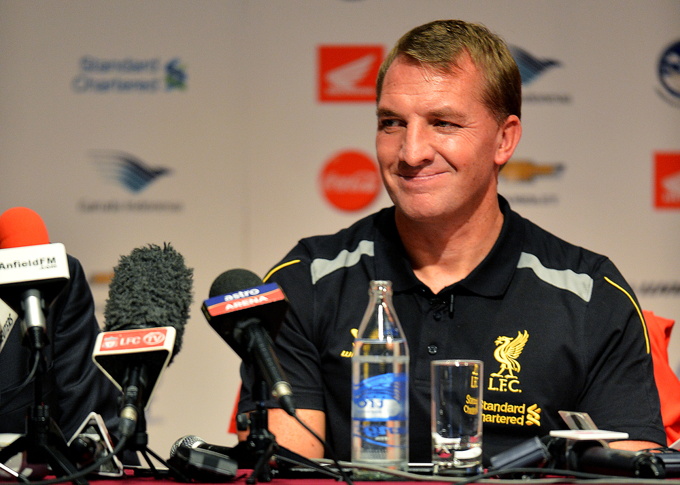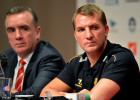
almonfoto / shutterstock
There’s an old adage that whether you think you can or whether you think you can’t, you’re probably right. The same seems to be true for whether or not you think Brendan Rodgers is the right manager for Liverpool Football Club.
He arrived in the Anfield hot seat talking of “death by football” and channelling Bill Shankly, but his first season was a slow burner, with the players struggling to understand his much vaunted philosophy.
Rodgers Second Season: 2013-2014
Yet in season 2 under Rodgers the Reds seemed to click with what the manager wanted, and he seemed to understand how to get the best out of the players at his disposal. In 2013 the Ulsterman won the Manager of the Month award for August after Liverpool won their first 3 games. Then in March 2014 Liverpool won all 5 of their games to see Rodgers collect his second Manager of the Month award.
The Merseysiders then went on a run of 11 wins to put themselves on the top of the Premier League with just 3 games to go. It seemed as though Brendan Rodgers was on course to steer Liverpool to their first title in over 20 years. A 2-0 loss to Chelsea at Anfield followed by a 3-3 draw with Crystal Palace at Selhurst Park put paid to that, though, and Liverpool finished second – missing out on the title by 2 points plus goal difference.
What The Fans Think
For some fans Liverpool’s unlikely title challenge was proof positive that the club’s owner’s, Fenway Sports Group, had made the right call when they brought in the ex-Swansea manager to mastermind Liverpool’s return to the top table.
For others, though, the main reason for the Club’s success was simple to explain: Luis Suarez. The Uruguayan scored 31 goals for the Reds, just 3 less than the all-time record goal-scorers in the Premier League of Andy Cole and Alan Shearer, who both managed 34.
The truth, of course, lies somewhere in between. There’s no question that Liverpool’s mercurial striker made a massive difference in Liverpool’s charge to the top. 31 goals is a huge return and in 4 out of the previous 5 seasons the top scorer represented the team that finished top of the league.
Yet Brendan Rodgers set up the team to get the best out of El Pistolero and, alongside him, Daniel Sturridge. Between them they scored 52 goals – more than half of Liverpool’s 101 goals total.
Rodgers Stats
Strikers Goal Scoring
Without Rodgers at the helm would either of those two strikers have been as prolific as they were? Obviously it’s impossible to tell for sure, but Suarez scored 4 goals in 13 games after signing for Liverpool in January of 2011. In the 2011-2012 season he made 31 league appearances and scored just 11 goals. It was only under Rodgers that Suarez’s goal tally seemed to go supersonic, with the striker notching up 23 goals in 33 games in 2013-2014.
| Season | Appearances | Goals Scored |
|---|---|---|
| 2011-2012 | 13 | 4 |
| 2012-2013 | 31 | 11 |
| 2013-2014 | 33 | 23 |
| 2014-2015 | 33 | 31 |
As for Sturridge, he scored 10 goals in 14 appearances in Rodgers’s first season in charge, before hitting 21 in 29 games in his second season.
| Season | Appearances | Goals Scored |
|---|---|---|
| 2012-2013 | 14 | 10 |
| 2013-2014 | 29 | 21 |
Is it a coincidence that Liverpool’s form has taken a dip since Rodgers’s team lost Suarez to Barcelona and Sturridge to injury? Almost certainly not. But neither is it a coincidence that the two strikers only really scored a prolific amount of goals after Rodgers’s appointment as the Anfield gaffer. They were a match made in Melwood.
Average Points
The Twitter user Andrew Beasley (@BassTunedToRed) pointed out that, after 31 games this season Liverpool had 54 points. The club average after 31 games in the previous 22 seasons is 53.6. The club have only had more points after 31 games 7 times in the last 17 seasons, or 10 times in the last 22.
It seems more than likely that the high of the 2013-2014 season has left some Liverpool fans with a sense of under-achievement and a feeling of being under-whelmed. Yet the simple fact is that Liverpool have performed to the club average when compared to the previous 22 seasons.
So Why The Hate?
So where does the dislike of Brendan Rodgers that is clearly evident in some of the Liverpool fan base come from?
There can be no questioning the fact that when Rodgers replaced a club legend in Kenny Dalglish some fans were displeased. Add to that the fact that FSG didn’t even bother to interview fan favourite Rafa Benitez, and it’s clear that Rodgers was fighting a losing battle with those that were less than impressed with his previous managerial record.
Rodgers’s History
A protégé of Jose Mourinho – himself someone that is hardly enamoured to the Red half of Merseyside – Rodgers hardly impressed in his first job at Watford, before leaving Reading by mutual consent after just 6 months in charge. Then Rodgers took over at Swansea and his stock rose significantly.
Rodgers was awarded the Championship Manager of the Month Award in February 2011 when he led the Swans to 5 victories out of 6. By the end of April he had secured Swansea’s place in the Championship Play-Offs, which, ultimately, led them to a place in the Premier League – the first Welsh club to do so.
But for Liverpool fans, who have become accustomed to winning FA, League and European Cups, winning promotion to the league that they would like to finish top of before too long was hardly a good CV enhancer.
Should Liverpool Replace Rodgers?
So should Liverpool look to replace Rodgers before the start of the 2015-2016 season?
In short, no.
Fenway Sports Group, rightly or wrongly, have set their stall out to run Liverpool in a very specific way. They want a young, progressive manager who knows how to develop youth players and is willing to explore different formations and tactical approaches. Or, to put it another way, they want a manager just like Brendan Rodgers. And the most Brendan Rodgers manager out there is…well…Brendan Rodgers.
So why get rid of the man at the top to try and replace him with a lesser version of that same person? FSG are unlikely to even contemplate it any time soon.
What Rodgers needs to succeed in the future is a discussion for another article, but the important thing to note is that he will be around Anfield in the future. He doesn’t have Suarez and Sturridge is a shadow of his former self, but he does have the support of those at the top and, for now at least, that should be enough to guarantee his job security.



